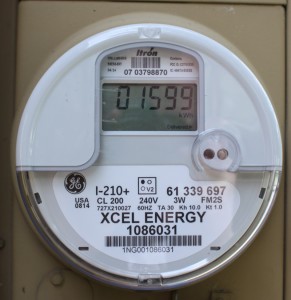I just got my latest Xcel energy-shaming statement. That’s the flyer that comes in the mail telling me whether I can lord it over others because I’m an “efficient neighbor” or whether I should feel ashamed because I use more energy than they do.

Specifically, it reads, “Here’s how you compare to your neighbors”—and then it rates me as “great,” “good,” or “using more than average” according to how little heat I use. It also tells me to keep my thermostat at 68 degrees and to wear slippers and an “extra sweater.”
As a former university professor, I’ve seen a lot of dumb products of political correctness, but this has got to be one of the dumbest.
The first reaction from a freedom-loving, red blooded American when reading this 8-1/2 X 11-inch diaper ought to be, “What I wear on my body or how much energy I choose to purchase is none of Xcel’s concern!” America didn’t become the greatest country on earth because heroes like George Washington and Douglas McArthur said, “Oops, I’d better lower the thermostat and wear a sweater.”
Then there is the impropriety of corporate management telling customers to stop buying the company’s product. Management has fiduciary obligations to its investors and moral duties to its workers, and this message violates those duties. Anyway, you can bet that if Xcel revenues go down, it won’t be the managers who suffer. They’ll continue to rake in the big bucks while they charge the loss to investors and workers. That is, until they can shift it to the rest of us. More on that in a moment.
You might ask, “Who are Xcel counting as my neighbors?” Most of us think of our neighbors as people living within a block or so. But acc![]() ording to Xcel, they dwell as much as a mile away.
ording to Xcel, they dwell as much as a mile away.
Well, I live in Lakewood, the city on a slant. Should I feel proud of using less natural gas than the family that lives on a windy corner 500 feet higher? Or ashamed because I use more than someone who lives in a sheltered nook 500 feet lower?
The flyer tells me that the ratings are based on dwellings of “similar size, building type, and heating system.” But that ignores (besides elevation) a lot of other variables. A house like mine could accommodate anywhere from one to six people. Should my wife and I feel ashamed of using more energy than a household of one? Should we feel proud of using less than a family of six?
If Joan has a home office, she probably consumes more home energy, but much less total power, than Jack, who commutes to an office. Yet by Xcel’s rating system, Jack is the “efficient neighbor” and Joan is the energy hog.
The flyer tells us that we should keep our thermostats at 68 degrees because “The Dept. Of Energy recommends 68º F.” If DOE really makes such a blanket recommendation, it ought to be abolished, and quickly. As everyone outside Xcel management knows, people have different heating requirements. Most 70 year-olds need warmer houses than most 30 year-olds. Nor can you dictate the same thermostat setting to the sick and the well, the handicapped and the robust, and those sleeping and awake.
To those of us whom 68 degrees leaves cold, the flyer suggests, “Try wearing an extra sweater and slippers.” (Does an “extra sweater” mean more than one?) I remember hearing that lecture during the Carter presidency. It was based on the prediction that America was going to run out of fuel by the year 2000—one of many alarmist environmental predictions that turned out flat wrong.
I hope Xcel’s recommendation is based on firmer ground than that. But I doubt it.
This flyer ill-serves not only Xcel’s investors and workers but us ratepayers as well. Xcel management employed our money to print, package, and mail it. If the flyer succeeds in its purpose and customers buy less energy, then Xcel will have to raise rates to cover its losses—which its monopoly position will enable it to do.
In closing, I must recognize a cost Xcel has imposed on some who cannot speak for themselves. The sheet tells us that it was “Printed on 10% post-consumer paper.” Translated, that means 90% new paper.
Think about it: Xcel actually killed trees to propagate this stuff.
Rob Natelson is a retired constitutional law professor who serves as Senior Fellow in Constitutional Jurisprudence at the Independence Institute, a free market think tank in Denver.


